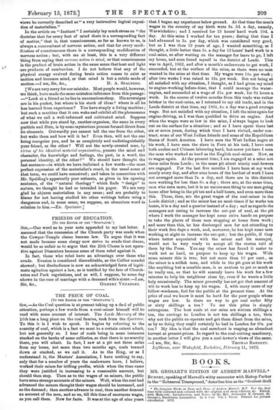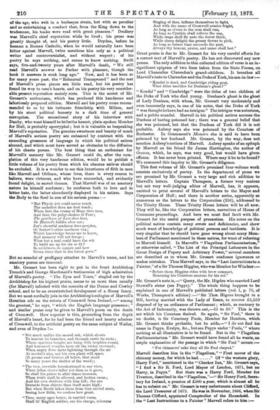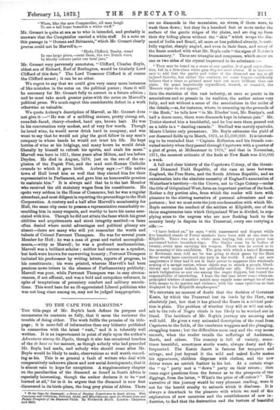BOOKS.
MR. GROSA.RT'S EDITION OF ANDREW MARVELL.* BURNET, speaking of Marvell's witty encounter with Bishop Parker in the "Rehearsal Transprosed," describes him as the "liveliest droll
* The Complete Works in Verse and Prose of Andreae Marvell, M.P. For the first tune fully collected and collated with the original and early editions, Ste. Edited, with Memorial, Introduction, and Notes, by the Rev. Alexander B. Grosart, St. George's, Blackburn, Lancashire. In 4 vols. Vol. I. Verse. Printed for private circulation. 1872.
of the age, who writ in a burlesque strain, but with so peculiar
and so entertaining a conduct that, from the King down to the tradesman, his books were read with great pleasure." Drollery
was Marvell's chief reputation while he lived ; his prose was greatly thought of, and his poetry little. Dryden, before he became a Roman Catholic, when he would naturally have been bitter against Marvell, twice mentions him only as a political writer and controversialist, and without respect ; of his poetry he says nothing, and seems to know nothing. Swift says, five-and-twenty years after Marvell's death, "We still read Marvell's answer to Parker with pleasure, though the book it answers is sunk long ago." Now, and it has been so for many years peat, the "Rehearsal Transprosed" and the rest of Marvell's prose pieces are little read, but his poetry has found its way to men's hearts, and on his poetry his very consider- able present reputation mainly rests. This is the secret of Mr. Grosart's enthusiasm, which has produced this handsome and laboriously prepared edition. Marvell and his poetry come recom-
mended to us by his intimate friendship with Milton, and by his stout political honesty in a dark time of general corruption. The sensational story of his interview with Denby, who went himself to bribe the honest, plain-spoken Member for Hull, is probably apocryphal ; but it is valuable as bespeaking Marvell's reputation. The genuine sweetness and beauty of much of Marvell's serious poetry are enhanced by contrast with the exeeeding grossness of language in which his political satires abound, and which must have served as obstacles to the diffusion of his chaste poems. The beat thing that an enthusiast for Marvell's memory like Mr. Grosart could do, after the com- pletion of this very handsome edition, would be to publish a
little volume of his poetry from which his obscene satires should be excluded. It is a wonder to see this luxuriance of filth in men like Marvell and Oldham, whose lives, there is every reason to believe, were virtuous, and who have succeeded, and evidently found delight, in sacred themes. That Marvell was of an amatory nature he himself confesses ; he confesses both to love and to bitter hate, the latter abundantly displayed in his satires. Says the Body to the Soul in one of his serious poems :--
"But Physic yet could never reach
The maladies thou me dost teach; When first the cramp of Hope does tear, And then the palsy-shakes of Fear; The pestilence of Lore does heat, Or Hatred's hidden ulcer eat ; Joy's cheerful madness does perplex, Or Sorrow's other madness vex ; Which knowledge forces me to know, And memory will not forego ; What but a soul could have the wit To build me up for sin so fit ?
So architects do square and hew Green trees that in the forest grew."
But no scandal of profligacy attaches to Marvell's name, and his amatory poems are innocent.
Mr. Grosart has been right to put in the front Archbishop Trench's and George Macdonald's testimonies of high admiration of Marvell's poetry. "The Eyes and Tears," singled out by the Archbishop for his highest praise, seems to us more than usually (for Marvell) infected with the conceits of the Donne and Cowley school, and to be an overstretched development of a flimsy fancy. But we most cordially join in the Archbishop's eulogies of Marvell's Horatian ode on the return of Cromwell from Ireland,—" among the greatest," he says, "which the English language possesses ; " and similar praise may be given to Marvell's poem on the death of Cromwell. How superior is this, proceeding from the depth of Marvell's heart, for he had been the friend and hearty admirer of Cromwell, to the artificial poetry on the same subject of Waller, and even of Dryden
!- "Not much unlike the sacred oak, which shoots To heaven its branches, and through earth its roots ; Whose spacious boughs arc hung with trophies round, And honoured wreaths have oft the victor crowned; When angry Jove darts lightning through the air At mortal's sins, nor his own plant will spare (It groans and braises all below, that stood
So many years the shelter of the wood);
"The tree, erewhile foreshortened to our view, When fallen shows taller yet than as it grow, So shall his praise to after times increase, When truth shall be allowed, and faction cease; And his own shadows with him fall; the eye Detracts from objects than itself more high: But when Death takes them from that envied state, Seeing how little, we confess how great.
"Thee, many ages hence, in martial verse,
Shall th' English soldier, ere his charge, rehearse
Singing of thee, inflame themselves to fight, And with the name of Cromwell armies fright, As long as rivers to the seas shall run,
As long as Cynthia shall relieve the sun, While stags shall fly unto the forest thick, While sheep delight the grassy downs to pick, As long as future time succeeds the past, Always thy honour, praise, and name shall last."
Great praise is due to Mr. Grosart for his very careful efforts for a correct text of Marvell's poetry. He has not discovered any new poems. The only addition to this collected edition of verse is an in- significant epigram of two lines taken from the State Poems, on Lord Chancellor Clarendon's grand-children. It breathes all Marvell's hate to Clarendon and the Duke of York, his son-in-law
" Kendal is dead, and Cambridge riding post, What fitter sacrifice for Denlaam's ghost?"
" Kendal " and " Cambridge" were the titles of two children of the Duke of York who died young. Denham's ghost is the ghost of Lady Denham, with whom, Mr. Grosart very moderately and even innocently says, in one of his notes, that the Duke of York "was thought to have had an intrigue." The intrigue was notorious, and a public scandal. Marvell in his political satires accuses the Duchess of having poisoned her ; there was a general belief that she was poisoned, but that the Duchess of York did it is not probable. Aubrey says she was poisoned by the Countess of Rochester. In Grammont's Memoirs she is said to have been poisoned by her husband. Mr. Grosart, by the way, does not mention Aubrey's notices of Marvell. Aubrey speaks of an epitaph, by Marvell on his friend Sir James Harrington, the author of Oceana, which, he says, was very good, but would have given offence. It has never been printed. Where may it be to be found? We commend this inquiry to Mr. Grosart's diligence.
This first volume of Mr. Grosart's promised four-volume work consists exclusively of poetry. In the department of prose we are promised by Mr. Grosart a very large and rich addition to Marvell's letters. Captain Thompson, a former very zealous but not very well-judging editor of Marvell, has, it appears, omitted to print several of Marvell's letters to the Mayor and Corporation of Hull ; and there is another series, apparently as numerous as the letters to the Corporation (256), addressed to the Trinity House. These Trinity House letters will be all new. Theywill be, like the Corporation letters, narratives of House of Commons proceedings. And here we must find fault with Mr. Grosart for the useful purpose of precaution. His notes on the political satires contain many errors and deficiencies, and show' much want of knowledge of political persons and incidents. It is very singular that he should have gone wrong about many Mem- bers of Parliament mentioned in these satires, for want of referring to Marvell himself. In Marvell's "Flagellum Parliamentarium," or otherwise called, "The List of the Principal Labourers in the Great Design of Popery and Arbitrary Power," several members are described as to whom Mr. Grosart confesses ignorance or makes mistakes. Thus Marvell says, in the "Last Instructions to a Painter," of a Sir Thomas Higgins, who was Member for Windsor :—
" Before them Higgins rides with brow compact, Mourning his Countess anxious for his act."
Mr. Grosart's note is,—" Query, the Mr. Higden who married Lord Stowell's sister (see Pepys)." The whole thing happens to be- explained in one of Marvell's published letters (vol. 1, p. 70, of Works, Thompson's edition) :—" Sir Thos. Higons brought in a
Bill, having married with the Lady of Essex, to recover £5,550 disposed of by an ordinance of Parliament ; which, as contrary to the Act of Indemnity, was thrown out,-63 to 88." This is the act which his Countess desired. So again, "Sir Pool," there is no doubt, is Sir Courtney Poole, Member for Honiton, which
Mr. Grosart thinks probable, but he adds,—" I do not find his name in Pepys, Evelyn, &c., but see Pepys under 'Poole," where nothing at all illustrative is to be found. But in the "Flagellum Parliamentarium " Mr. Grosart would have found all he wants, an ample explanation of the passage in which "Sir Pool" occurs :— " For chimneys' sake they all Sir Pool obeyed."
Marvel describes him in the "Flagellum," " First mover of the chimney money, for which he had " Of "the western glory, Harry Ford," mentioned in the "Checker Inn," Mr. Grosart says, "I find a Sir R. Ford, Lord Mayor of London, 1671, bat no Harry, in Pepys." But there was a Harry Ford, Member for Tiverton, described in the "Flagellum,"—" Sir Henry Ford, Secre- tary for Ireland, a pension of 1500 a your, which is almost all he
has to subsist on." Mr. Grosart is very unfortunate about Clifford, the Lord Treasurer of 1673. He was in November, 1666, when Sir Thomas Clifford, appointed Comptroller of the Household. In the "Last instructions to a Painter" Marvell refers to him
"When, like the new Comptroller, all men laugh To see a tall louse brandish a white staff."
Mr. Grosart is quite at sea as to who is intended, and probably is unaware that the Comptroller carried a white staff. In a note on this passage in " Oceana and Britannia," which Mr. Grosart clearly proves could not be Marvell's,--.
"Hyde, Clifford, Denby, stand In one large piece,—next them, the two Dutch wars, In bloody colours paint our fatal jars,"
Mr. Grosart very perversely annotates, "Clifford, Charles Boyle, eldest son of Richard, Earl of Burlington, would be titularly Lord Clifford of this date." The Lord Treasurer Clifford is of course the Clifford meant ; it can be no other.
We regret to say that we could give very many more instances of like mistakes in the notes on the political poems ; these it will be necessary for Mr. Grosart fully to correct in a future edition ; and he must take much greater pains with the notes on Marvell's political prose. We much regret this considerable defect in a work -otherwise so valuable.
We quote Aubrey's description of Marvell, as Mr. Grosart does not give it :—" He was of a middling stature, pretty strong set, roundish-faced, cherry-cheeked, hazel eye, brown hair. He was in his conversation very modest, and of very few words. Though he loved wine, he would never drink hard in company, and was wont to say that he would not play the good fellow in any man's -company in whose hands he would not trust his life. He kept bottles of wine at his lodgings, and many hours he would drink ?liberally by himself to refresh his spirits, and exalt his muse." Marvell was born in 1611, three years after Milton, and ten before Dryden. He died in August, 1678, just on the eve of the ex- plosion of the Popish Plot, and the mad anti-Roman Catholic -crusade to which it gave birth. Aubrey says;—" His native town of Hull loved him so well that they elected him for their representative in Parliament, and gave him an honourable pension to maintain him." It is always said that he is the last Member who received the old statutory wages from his constituents. He spoke very seldom in the House of Commons, but lie was a regular attendant, and most diligent in reporting the proceedings to the Hull Corporation. A century and a half after Marvell's membership for Hull, the earns city came to possess a representative remarkably re- sembling him in many respects, and worthy to have his name asso- -elated with him. Though he did not attain the fame which his great abilities and acquirements and stout integrity merited—a fame -often denied where social advantages and political pliancy are absent—there are many who will yet remember the worth and .talents of Colonel Perronet Thompson. He was for several years Member for Hull ; he was a man of great and varied accomplish- menta—witty as Marvell ; he was a profound mathematician, Marvell was a brilliant scholar ; neither had success as a speaker, but both were known for unswerving honesty ; Perronet Thompson imitated his predecessor by writing letters, reports of progress, to his constituents ; his were printed, whereas Marvell's had been precious news-letters in the absence of Parliamentary publicity; Marvell was poor, while Perronet Thompson was in easy circum- stances, if not affluent, and was a bold and outspoken reformer, in spite of temptations of pecuniary comfort and military associa- tions. This word here for an ill-appreciated Liberal politician who was not long since among Us, may not be judged inappropriate.




































 Previous page
Previous page